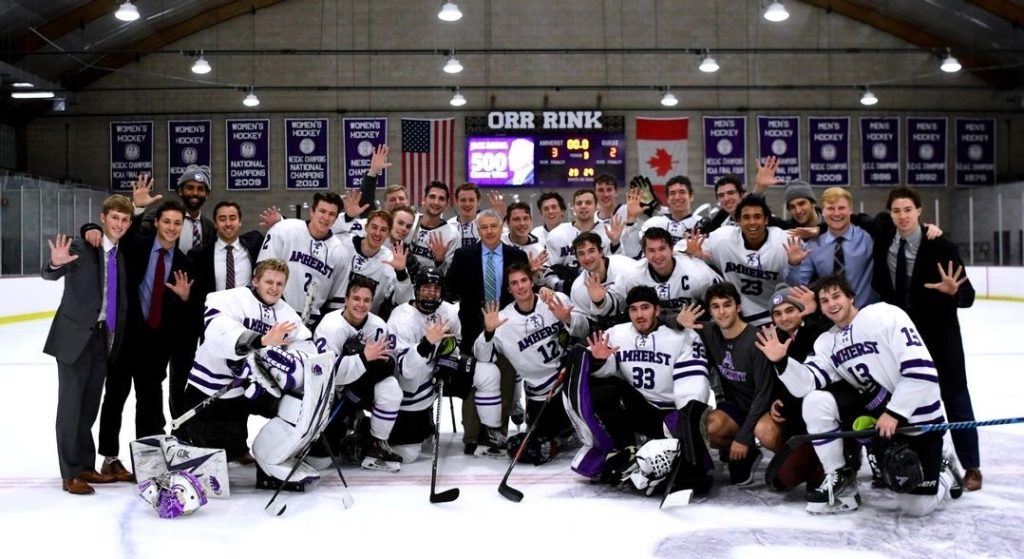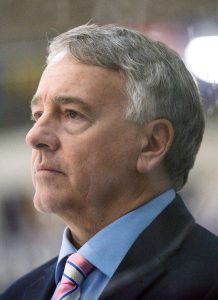
“I always thought it would be better to leave a year early than a year late.”
And with that, the longest-tenured active head coach in any sport in the NESCAC, Jack Arena, announced his retirement from coaching.
Arena, who took over as the head men’s hockey coach at Amherst only five months after his 1983 graduation from the institution, steps away after 42 years guiding the Mammoths on the ice.
“I still love the on-ice piece, my relationships with the team and the students, and I love practices more than anything else,” Arena said. “I think it’s all the other stuff that goes along with the job that has become less enjoyable. So it was important to me that I leave while I still enjoyed what I was doing.”
Arena leaves after 41 seasons and 537 wins – the 26th most wins by any men’s ice hockey coach at all levels of NCAA play and the 12th most all-time among Division III coaches. Along the way, Arena’s teams at Amherst won two ECAC championships (1992, 1996), three NESCAC championships (2009, 2012, 2015) and advanced to the Division III Frozen Four twice (2009, 2015).
Arena will continue to work at Amherst in other capacities following his retirement from coaching. His roles will cover talent evaluation and recruiting support for both the men’s and women’s hockey programs as well as coaching development and mentorship.
“Jack has been the heart and soul of the men’s hockey program for over four decades,” Amherst director of athletics Don Faulstick said. “His dedication to the school where he once played, and later led, is deeply impressive. His legacy will live on through the countless lives he’s impacted, both on and off the ice.
“While Jack is retiring from coaching, we are fortunate that he will remain a vital part of our department, continuing to support both hockey programs and serve as a mentor to our coaches. His leadership and influence will continue to shape our future for years to come.”
Arena has been named the ACHA national coach of the year twice and the NESCAC coach of the year three times in his tenure.
More importantly – to the man himself – Arena changed the culture of hockey at his alma mater, focusing on family and valuing teaching even more than winning.
“One of the things that’s always been important to me is to be an example and to try and show these guys … to be human,” Arena said. “Family has always been the most important thing to me and I would bring my kids, when they were very young, around the locker room and sometimes they would come on trips with us. I wanted the teams to see that I was committed to what I was doing (coaching) and I worked as hard as I could at it, but I was a father too, and my family was equally important.”
Arena’s ability to combine family and his hockey program became evident when his oldest son, Patrick Arena, came to Amherst and played for his father. His younger son, Johnny Arena, also attended Amherst and played golf and was a part of the hockey program’s operations team.
It was Patrick who helped drive home a point to his father about just how special Amherst really is.
“At some point during his freshman fall, I asked him, has it been what you expected? And he said, ‘No, it’s been better,'” Jack said. “And it surprised me. I was like, Really, what do you mean? It’s been better? And he said, ‘I had no idea the quality of the people you’re surrounded by here.’ And this is someone who has been surrounded by it their whole life. And then he gets immersed in it, and he’s like, wow, this is even better than I thought.”

For Arena, even though the world has changed a lot over his four decades plus at Amherst, what makes the institution special has not.
“Certainly as society’s changed, parts of Amherst have changed with it, but the core of what Amherst has always been is still the core,” he said. “It’s high quality people, intellectually curious, and everyone wants to do well and wants to do well in everything they do. They take pride in what they do.”
Arena, who first came to Amherst in the fall of 1979 after graduating from Milton Academy, is an icon of New England hockey circles.
He was a standout hockey player at Amherst and the Purple & White’s fourth all-time leading scorer, completing his career with 140 points. He capped an outstanding playing career by being selected the Hobey Baker Award winner as the most outstanding Division III collegiate player in the country.
But stats and trophies have never really mattered to Arena.
“Without a doubt, I will miss the interaction with the guys on the team,” Arena said. “The practices are my favorite part. The teaching is still my favorite aspect of the job. I will miss that tremendously.”
A nationwide search for Arena’s replacement will begin immediately.
